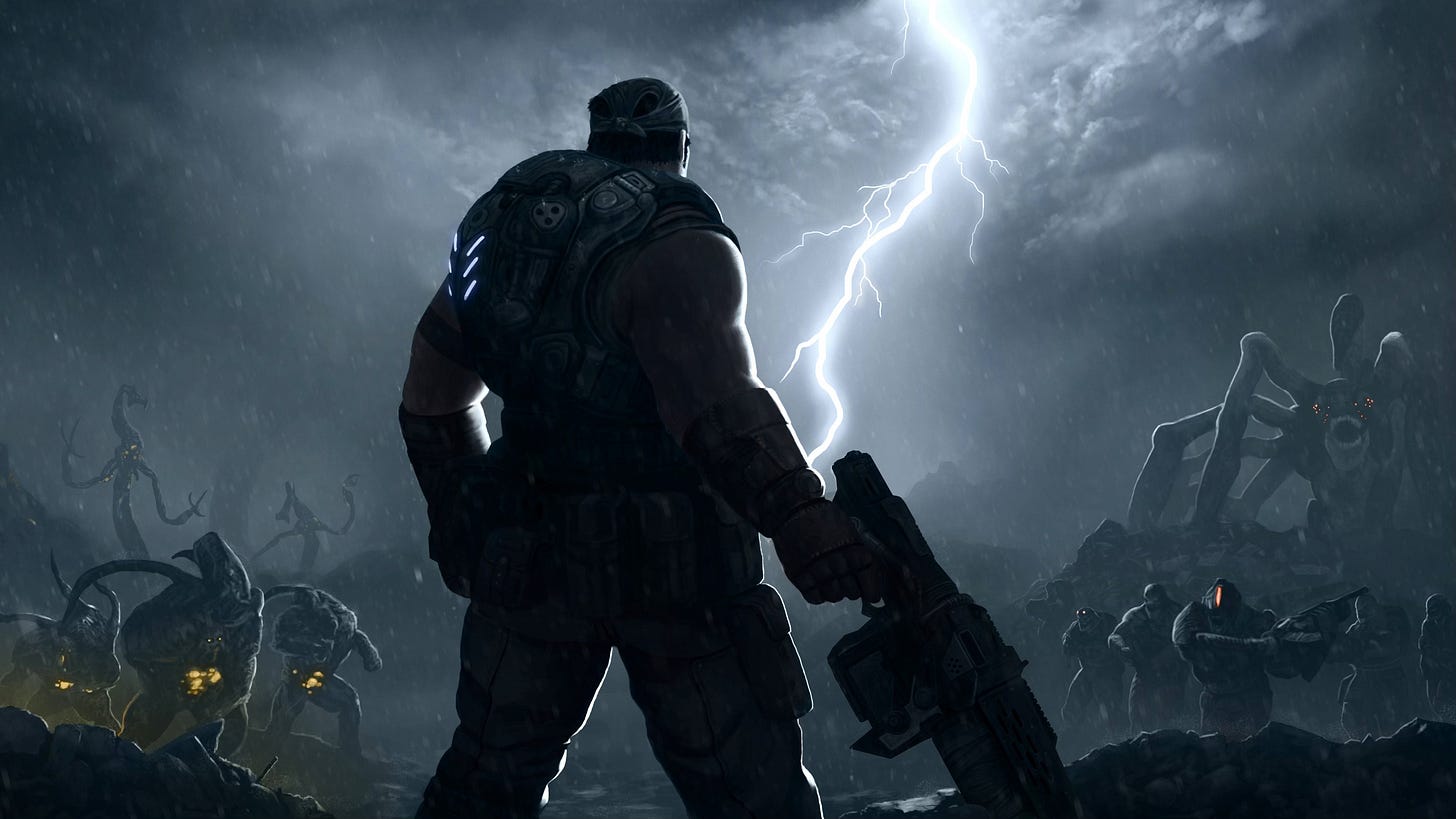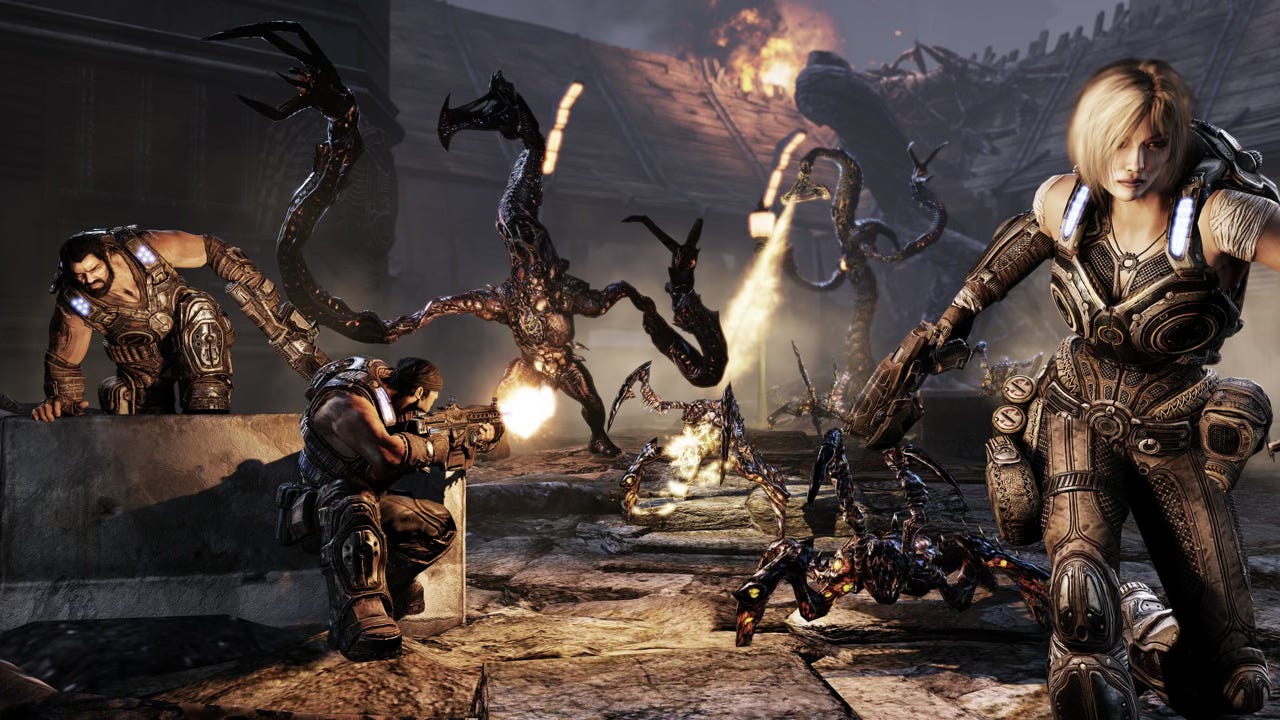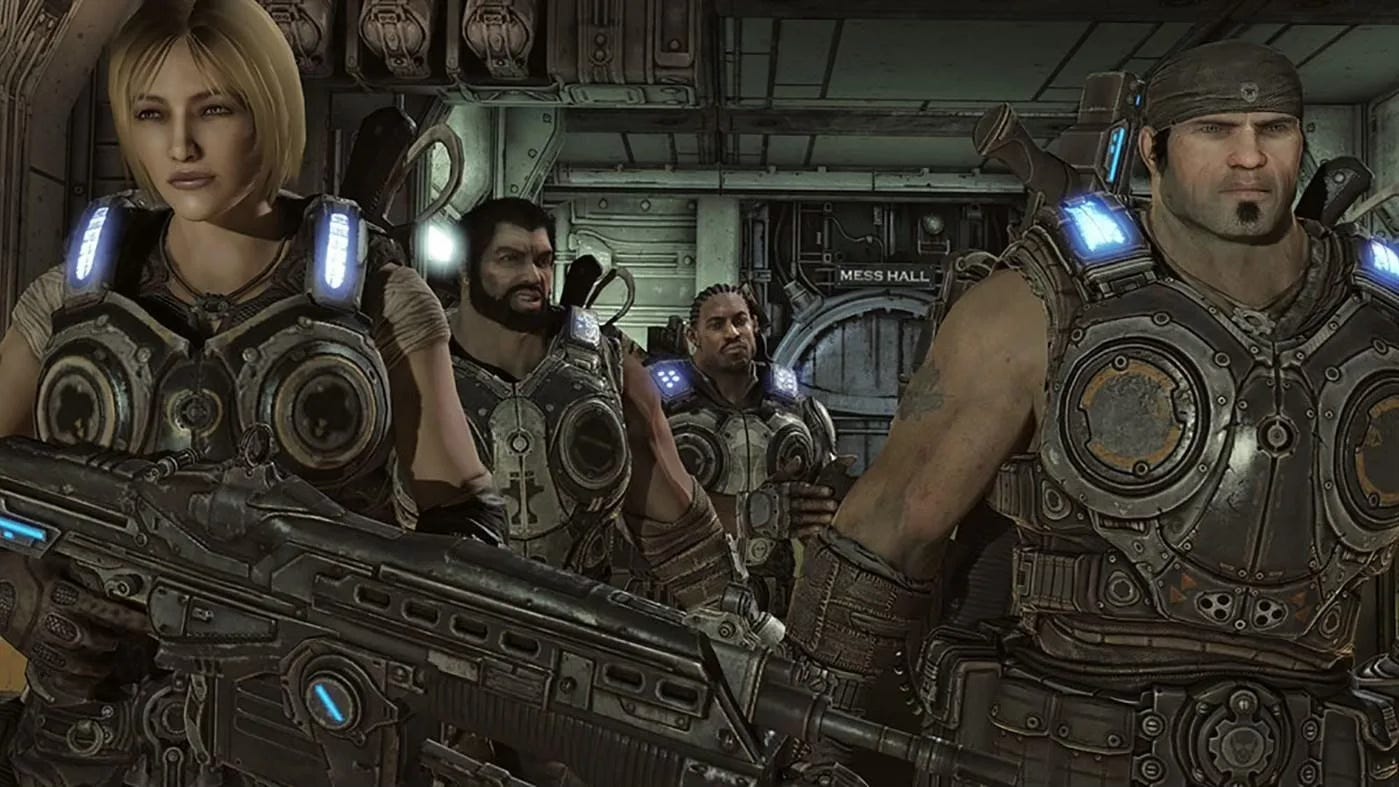An Interview with Karen Traviss - Gears of War Novelist and NYT Bestselling Author Part 3 (The Traviss Legacy)
Gears of War 3 is a chef's kiss for the fans and a love letter from Traviss herself.
Welcome back to my penultimate post with Karen Traviss about her role in the Gears of Wars universe.
Years ago after playing through Gears of War 3, I remember liking it and I remember Dom dying but not much else. It wasn’t until after reading the 5 books Traviss had written that I understood the whole picture that she/Epic Games was going for with their trilogy. The culmination of choices made by the franchises’ characters, the ethics of war, the use of weapons of mass destruction and self sacrifice.
As Traviss will admit, this was an alignment of the right “stuff.” The right people were working on a series at the right time in video game history and reached out to the right person to handle the material. There are many moving parts in creating a property this size as well as “too many cooks in the kitchen” that it can all be botched. Gears of War 3 is one of the few examples of a perfect conclusion for fans.
Before we see where Karen is at these days, let’s hand her the mic to talk about her time with Epic by the time we get to Gears of War 3.
Jesse: I would like to talk about Gears of War 3. I recently replayed the game after reading all 5 of your books. I remember liking Gears of War 3 but didn’t remember much about it. When I booted it up again it was like walking into the 6th novel, in a sense. I knew why they were on the Sovereign and why Prescott and Hoffman were gone. It was a brand new experience and I have such an appreciation for Gears 3 now outside of it being a “very good trilogy conclusion.” Gears 3 is a love letter to fans of the series and rewarding too for those who spent time in the world.
I can imagine Gears 3 being a rewarding experience for you too in that you were able to fully mesh your vision of Gears with the developers and incorporate the world you worked on in the pages of the novels.
I guess it’s less of a question and more just wanting to know how that all felt to see someone like Bernie show up in-game or Anya in her badass Gears-outfit after pushing herself to train.
Traviss: You're probably going to find this hard to believe, but other than seeing the game in its component parts as things went along, I didn't see the fully assembled game and I still haven't. It'll always be a collection of its parts to me. The cinematics director, Greg Mitchell, gave me a DVD of all the cinematics so that I had an archive record of it, but I still haven't watched it, nor have I played the game, although I have nice collector editions. And I spent so long on the game that I'm not sure I'd have been able to see it for what it was. That's not a reflection on the game itself, it's just how I process things. I'm equally incapable of judging any of my books or comics for a long time afterwards, when I've forgotten writing them. It can take years for me to be able to stand back far enough to assess my own work. I normally don't feel satisfied with what I've done at the time. I rarely go back and look at my own work unless I have to, and when I do it's almost always because a fan asked me a question and I can't remember. When I revisit stuff, I think, "Damn, did I really write this? Oh. I did. Well, well." It's like an out-of-body experience with the written word. It might sound weird, but I have a writer friend who does exactly the same. I always put it down to being in the characters' heads at the time of writing so memories don't form the same way as when something happens to you personally.
And I'm a mover-on by nature. I'm very much out of sight, out of mind, alas. Work-wise, I almost never look back, and I do mean that literally – I just stop thinking about what I've just worked on and I don't keep up with IPs I've worked on. I have no idea what happened in Gears 4 and 5, for example; it all ceased to exist in my head as soon as I left. I get readers of other IPs telling me that such-and-such TV show used my stuff and what I think about it, and they're surprised when I say I didn't know the show existed, let alone watched it. (And as I don't get a penny for the use of IPs made from what I created for them, I don't want to know. It's just an insult to injury.) So it's always a surprise for me when people discover my work from what feels like another century and I'm working on novel number thirty-something. It's fresh to them; for me, it's completely buried, unless I make a real effort and stop working to go through it again. Those IPs I've worked on don't earn me a penny, so I can't justify stopping work on my current books that put food on the table to divert effort into my old stuff, unless people are going to buy my other books, which they probably won't. (Yes, I know that sounds harsh, but this is my living.) The older I get, the more that applies. The last 20 years shot by and I don't have another 20 left ahead of me, so I ration my time carefully.
Actually, there is one thing I hark back to. Because I was involved in the audio recording sessions for the game, I got to work with some great voice artists. Fred Tatasciore was one of my favourites (unbelievable range of voices and a lovely guy to work with) and he kindly narrated my first Nomad novel, The Best Of Us. Whenever I see his name in the credits for some animation – and I always check – it brings back good memories. So, maybe it's not as completely purged from my brain as I thought.
Obviously I was pleased with the reception that Gears 3 got. I make a point of never reading reviews of any of my work, because I used to write a TV column and I know how distorted a critic's view becomes, but even if critics love something, it's the fan reaction that actually matters. I got plenty of nice messages from Gearheads. I loved Gears as a writer and I'm proud to have worked on it, and I'm proud of what we achieved as a team, so Gears will never be quietly sidelined on my web site or become “Something I Don't Talk About.” It will always be the best IP I ever worked with, on every level. Friends asked why I did game IPs when I was a "literary" writer and I said I did it because I was seen as a literary writer – the ultimate human questions were all in that game, so why wouldn't I give it a serious treatment? I don't accept the distinction between literary and commercial fiction at all and I certainly don't tolerate any of the snobbery that often goes with it. All my books are written the same way, with equal effort and craft, and readers who don't buy everything on the Booker Prize list are as entitled to the best quality I can deliver as anyone else. A fan wrote to tell me I'd "legitimised" game fiction, and although that was a lovely compliment, it also made me want to go and find whoever made him think his reading choices weren't legitimate to start with and have a serious word with them.
But I knew my involvement with Gears was a rare conjunction of planets, a brief period with the right IP and the right people at the right time, who gave me enormous latitude and opportunity and let me get involved with all aspects of the game, and I knew that it would pass. I had that feeling from the start and I appreciated it accordingly. It was very wabi sabi. When it came to the game, Epic had already had two different writers for the first two games so I assessed my professional lifespan accordingly. I knew it would be an end of it, and that it would be time for me to wind up the novels too, because that arc was complete and I didn't want to do more books if I wasn't going to be doing another game, because I'd written that way with other IPs and I didn't want to go back to working in a silo, trying to guess what I hadn't been told that I actually needed to know. It was also a difficult period for me personally: my mother was terminally ill. I was writing The Slab at the time. I'd take my iPad to the hospital and write a bit, because she was often asleep on painkillers, and now I wish I hadn't. She died in the summer, we launched Gears 3 in the autumn, and then my father had a stroke, so it was the beginning of difficult years on the family front. After a lifetime of putting work first, I had different priorities, perhaps far too late. I'd also run out of patience with publishers, so when I'd delivered my existing contractual book commitments, I said screw that, requested the return of my creator-owned series that was about to go into production but not published yet, and became an independent. (I never spent an advance until a book was out, you see. I'm very much a "just in case" type.) Ten years on, I wish I'd done it far sooner. The decisions on every aspect of the books are mine, and so is nearly all the revenue for a change. And I pick my own editorial team.
Anyway, back to working on the game... when you're on a team project, you have the daily reactions and feedback of other people to benchmark what you're doing, which you don't get with a novel, or at least that's how it's worked for me. Novels are isolation work. I reached the stage with another franchise where they didn't even ask for novel outlines in advance, so unless I asked them questions, they wouldn't know exactly what I was turning in until I delivered the manuscript. But I'd keep them posted because I didn't want someone crashing into my continuity without realising it and derailing months of work. Actually, now that I come to think of it, Gears was informal like that too, but we were working so closely together on various things that we just talked a lot, so there were no surprises. I like to think I earned that trust and I know I was seen as a safe pair of hands who could be left to get on with things, but you have to remember I'd never written a game before, let alone a triple A, although I'd done a bit of development work for another game property (for which the very well-resourced studio never paid me. ) I hadn't written comics before, either. Epic took a gamble on me with both. Now, I'm not an idiot, and I understood the requirements of story in different media even if I hadn't worked in that format before, although my TV background did help a lot, but it was still an act of faith on Epic's part.
The thing about Gears 3 is that all the Epic staff on the game knew I cared about the product and took it very seriously, and that mattered to them. I didn't see it as popcorn: it was a hugely expensive product that had already earned a lot of money, people's livelihoods depended on it, and I wanted to do the very best I possibly could because the game deserved it. That started with the first novel. When Gears 1 came out, there were the inevitable critics who dismissed it as just a brainless violent shooter, which it obviously wasn't. I wouldn't have reacted so strongly to the promo without even knowing what the game was if it hadn't picked up some vibe that made me wonder about the world it was set in and what that armored guy was doing picking up that broken statue and contemplating it. When I turned in Aspho Fields, some of the Epic staff said they were really pleased to see the IP treated seriously and that someone else saw its quality and cared about it as much as they did. That made quite an impression on me. As far as I was concerned, I didn't have to give Gears some kind of respectability, or do any remedial work or make it look better than it was: it was already a great IP. But having a novel that said, "Look, this is what's really going on in this game, so think about it," made a difference to them. Mutual respect is something to be cherished in this industry, and it certainly fosters team spirit.
The idea was to cover the whole story arc in different media – my original task was to fill in the world and events between games and that content would inform the game itself. You'll notice that there's no overlap in the story between games, novels, and comics. They all slotted together into a continuous narrative. I'm not sure if that worked completely, because some people will never pick up a comic, or play a game, or read a book, even if it's part of a universe they love and there's crucial plot information in it, but it was worth doing. I felt each medium could tell its part of the story best, and of course that fits the way I work. I'd never do a "book of the game" because I just can't tell other people's stories. My mind doesn't work that way. The only novelisation I did wasn't the movie's story, although that was because the studio didn't provide information in time, which is apparently not uncommon. A movie generally only has enough story meat in it to sustain a 20,000 word book, according to a colleague who did a lot of novelisations, so I would still have needed a lot of extra material from me. When you look at a typical movie script, you can see why. It's not that long and not enough happens in it for a book, even if it has enough story logic to sustain a novel treatment, because you have to show a lot more working-out in a novel, not just a series of action sequences. Those don't stand up on their own in print. The average novel is 80-100K words and mine are two or three times longer, so even at the low end there's a lot of empty space if you try to stick to only what's in the movie. (If you ever find out what that is.) So I said if there was no information forthcoming in sufficient time for me to write a full novel, they'd get the story I gave them. And that's what happened – I wrote a different story with what I could glean of the movie's content as occasional B-plot scenes. The novel was a best-seller, so nobody cared, but I made a point never to agree to a job like that again. Life's too short. Yes, I know I'm mentioning a lot of negative things, which I would have advised someone never to do with my PR flak hat on, but one thing Gears showed me was that the working culture writers generally accept doesn't have to be that way.
Gears 3 had way more going on than we could fit in the game, as it turned out. There was a level or two we had to omit purely because there was too much material, so I reused what I'd written for all that in the books because it was story detail I felt was necessary to put Marcus's actions in context. I think that says it all about how Epic approached the game and how seriously they took the story: ask any games writer over a beer about their job, and quite a few will tell you they're called in nearer the end of the process and asked to nail a story onto something that's already mostly finished. (I laughed my arse off when I read a comment by a highly respected games writer who said the job was applying lipstick to a corpse.) I don't know if the industry's changed in recent years, because I don't keep up with it these days, but back in the day I had several approaches that went something like this:
"We want you to write this game."
"Okay, tell me more about it."
"We've finished all the levels and this happens and that happens, and then X does this, and... "
"So... you've already got a story."
"No, we want you to do that."
There are a lot of good people around who could fix that for them, but I'm not one of them. I always say I can make a story out of anything, that if you just give me two or three completely unrelated objects, people, or events – totally random stuff – I can make it work because that's how human brains work, but that doesn't mean I like doing it. The way to do it, if story and characterisation matters – and there's no law that says it has to, of course, because games can be just fine without either – is to get the writer in at the start to give their input in parallel. If the game depends on characters with established personalities, you can offer up something that fits the gameplay as well as the characterisation. Reality check: writers are the cheapest line item in a big game (or anything, to be honest) because building the assets is what costs the money. It's easier to get the writer to fix something with dialogue or in a cinematic than to produce new assets. But it's better to iron all that out first because it'll be a bit harder to rewrite a superhero who's laying mines in the grounds of an old folks' home. But wait! He can defuse them instead and reinforce his heroic image! And so the writer sorts it out. (That's a completely OTT made-up example, by the way. I felt I had to make that clear because you never know.)
So yes, Gears 3 and Gears in general was a once in a lifetime event, as I knew at the time. It taught me an enormous amount about making a game, gave me experience I'd never have got anywhere else, gave me my break in comics, and in its way it set me on the path to being an indie, because it brought home to me that some of the things happening to me with other companies were neither acceptable nor normal, and that I needed to take action about that. Thank you, guys. It was a blast.
Stay tuned for Traviss’ final post about her current work and projects.





